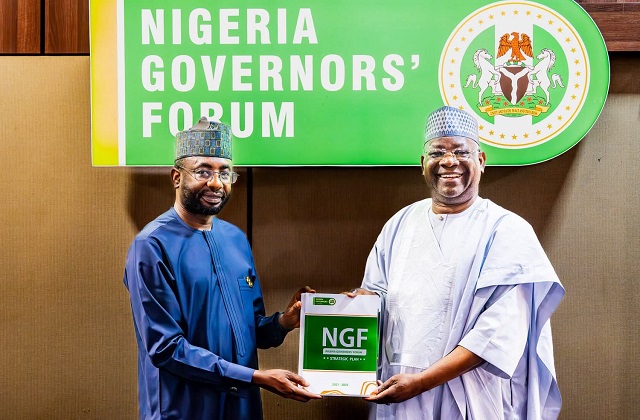Nigeria’s journey toward inclusive digital prosperity demands a united front, one where federal, state, and local governments move in synergy to embed technology at every level of governance.
This was the central message delivered by the Director General of the National Information Technology Development Agency (NITDA), Kashifu Inuwa, during a strategic engagement with the Nigeria Governors’ Forum (NGF) in Abuja.
Inuwa emphasized that Nigeria’s digital future cannot be built from the centre alone, and called for a stronger alliance between federal and subnational governments to ensure that every community benefits from the country’s growing digital economy.
“Our mandate isn’t just federal, it’s national,” Inuwa said. “Digital transformation must be localized, and that means embedding NITDA’s initiatives directly within state and local government structures.”
Highlighting the country’s remarkable progress, the NITDA boss noted that Nigeria has grown from less than 500,000 computer users in the early 2000s to over 130 million internet users today.
He added that the ICT sector’s contribution to GDP has soared from below 0.5% to over 17%, underscoring the transformative power of technology when supported by effective partnerships.
According to Inuwa, this evolution was made possible through collaboration among government agencies, the private sector, and international development partners, a model that must now be replicated across states to achieve inclusive growth.
Reaffirming NITDA’s commitment to a “digitally empowered nation that leverages technology for shared prosperity,” Inuwa referenced the Agency’s Strategic Roadmap and Action Plan (SRAP), a comprehensive blueprint anchored on eight key pillars.
At the heart of SRAP, he said, is “Fostering Digital Literacy and Cultivating Talent,” a top priority in NITDA’s vision to make digital skills accessible to all Nigerians. Through initiatives such as the 3 Million Tech Talent (3MTT) Programme and the National Digital Literacy Framework (NDLF), the agency aims to achieve 70% digital literacy by 2027 and 95% by 2030.
To make this vision a reality, NITDA is collaborating with the Federal Ministry of Education, the National Universities Commission (NUC), and the National Board for Technical Education (NBTE) to embed digital skills training across primary, secondary, and tertiary curricula nationwide.
“If every Nigerian can use technology to learn, work, and innovate, then our digital economy will not just grow—it will transform lives,” Inuwa affirmed.
Inuwa also announced ongoing collaborations with the Head of the Civil Service of the Federation and the National Youth Service Corps (NYSC) to train civil servants and corps members through the NYSC Digital Literacy Champions Initiative, which is expected to reach over 10 million Nigerians annually, particularly in the informal sector.
“No one succeeds in isolation. We must work as an ecosystem to create prosperity and inclusivity through technology,” Inuwa added.
He also invited state governments to actively participate in NITDA’s upcoming International Conference on Electronic Governance (ICEGOV) and Digital Nigeria Conference, designed to foster cross-state learning and collaboration in digital governance.
Inuwa concluded by reaffirming NITDA’s commitment to leveraging partnerships to integrate technology into governance and enhance public service delivery at all levels.
In his remarks, Dr. Abdulateef Shittu, Director General of the Nigeria Governors’ Forum (NGF), described NITDA’s visit as a significant step toward strengthening intergovernmental collaboration in driving Nigeria’s digital economy agenda across all 36 states.
He commended NITDA’s leadership in advancing digital transformation, noting that technology has become a key enabler of competitiveness, opportunity, and inclusive development.
“We deeply appreciate your leadership and the critical role NITDA continues to play in advancing Nigeria’s digital economy. In an era where technology defines competitiveness and opportunity, your work stands at the heart of our nation’s transformation,” Shittu stated.
Dr. Shittu stressed that digital transformation goes beyond administrative efficiency, describing it as a “national imperative” capable of improving service delivery, expanding economic opportunities, and uplifting millions of Nigerians.
He highlighted the Forum’s ongoing efforts, including the Digital Public Infrastructure (DPI) Readiness Report and the Intelligent Revenue Authority Readiness Report, which guide subnational reforms in digital identity, data exchange, payments, and trust systems.
“These reports are already shaping conversations and actions at the subnational level,” he noted, adding that collaboration on Technical Standards for DPI and the Nigeria Data Exchange Framework will further enhance interoperability and secure data sharing across government systems.
“With strong partnership and shared accountability, we will unlock a future where every Nigerian, urban or rural, has access to the tools and opportunities of the digital age,” he added.

